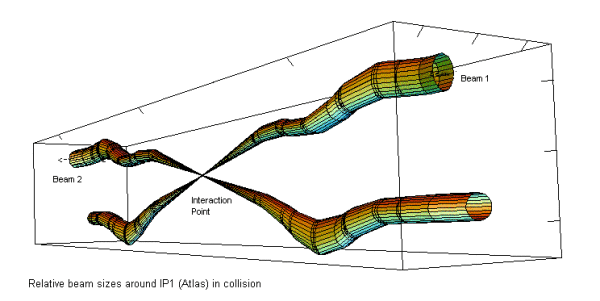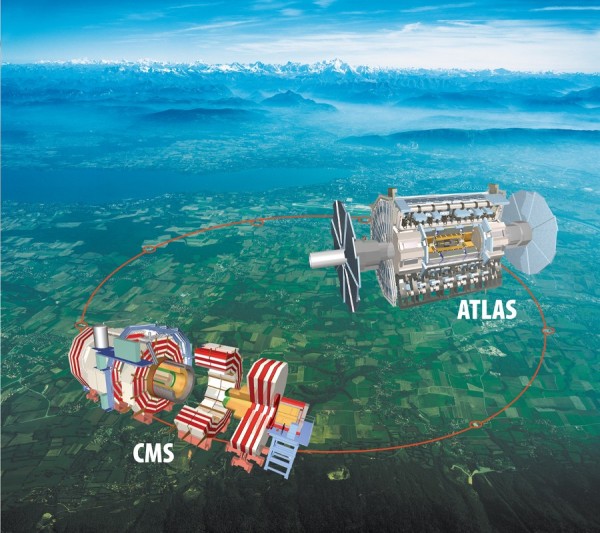“Let them see that their words can cut you and you’ll never be free of the mockery. If they want to give you a name, take it, make it your own. Then they can’t hurt you with it anymore.” -George R.R. Martin
Well, it's finally happened! After a two year upgrade, the LHC is back in business, running again, colliding protons and set to ramp up to a record-setting 13 TeV collision energy between the two beams!
 Image credit: CERN / ATLAS Collaboration, via http://lhc-machine-outreach.web.cern.ch/lhc-machine-outreach/collisions….
Image credit: CERN / ATLAS Collaboration, via http://lhc-machine-outreach.web.cern.ch/lhc-machine-outreach/collisions….
What will we find? How will we find it? And why do we have a better chance of discovering new physics here than anywhere else?
Come learn the five things everyone needs to know about the LHC, upon its restart, here!


Now, there's a screwup .......
HARDON COLLIDER RESTART - BBC ? ? Well done! Must be something to do with the intense magnetic fields.
How long did the Higgs event last for when it was 'found'?
Apparently initially the engineers wanted to push the LHC to work at 14 TeV!! Their limiting it to aiming for 13 TeV now to reduce any technical difficulties. It's still absolutely massive.
Barely any comments on black holes devouring our world... I think this (the LHC, not the black holes) is amazing news. At this moment the world's biggest physics experiment is taking place. If the Higgs boson could have been discovered 2 years ago, imagine what we could discover now with the LHC running at full capacity. I have questions though; what if we keep on discovering new particles? Is there any theoretical or experimental limit that we are currently aware of? Or should we simply accept that our model of fundamental physics will never be perfect? Questions, questions, questions... u15028462
There are two schools of thought on the idea of an end to particles.
One think there isn't, one think there is. the former generally converge on the idea that many particles are false particles, resonances in the energy transfer of two actual particles that are given the name of a particle.
This is pretty much the explanation of string theory for the existence of particles too.
LHC generated black hole question:
Higher and higher energies let you resolve smaller and smaller things, but there seems to be a lower limit. At a certain level of power you start to generate black holes. Once you get to that point, more energy pumped in just results in bigger black holes. My question is what amount of energy represents the sweet spot? What level of energy results in visibility of the tiniest things? Is 13TeV close to that level?
Where do you get this seeming from?
Imagination? Science fiction? Fear?
Where?
(Referred here from https://medium.com/starts-with-a-bang/the-lhc-made-simple-5614a2585f09)
I remember the first lecture I ever attended on quantum mechanics and atomic structure, my lecturers opening words were "Everything you think you know is wrong". These turned out to be highly accurate words because by the end of the lecture I was convinced that nothing was really real and none of us actually existed.
So despite the sound beating my perception of reality took I was deeply fascinated with the mechanics and physics that governs everything, especially on the scale the LHC (Large Hadron Collider) studies.
This Blog summed it all up very well and made it understandable for people who have not studied the subject in too much detail, myself included.
It really makes me wonder. How many more particles are out there to be discovered and will there be any discoveries that completely change our understanding of the universe? I am very excited for the possibilities.
Student Number: 15035868
Wow can new particle,atom electron or new elements be created? was there any contradiction to what was found long ago by scientists to new discovered information and theories?
This is all going by memory, so people please correct me if (more likely: where) I'm wrong. In nuclear physics, IIRC the general rule of thumb has to do with strong and weak force interaction speed and "new particle" decay rate. If it takes a new collection of protons and neutrons a relatively large number of strong or weak force interactions before they fly apart, then you had a new element or isotope. If they fly apart after a minimal number of interactions, you didn't. I forget in terms of half-lives approximately where the time cut-off is, but the general principle is that just successfully hitting object 1 with object 2 isn't enough to say you've discovered a new element or isotope; to get that sort of discovery, the product actually has to stick around for longer than it would physically take it to fly apart.
That's for new assemblies of protons and neutrons; I don't know if particle physicists follow a similar sort of definition of 'new particle' when talking about new assemblies of quarks.
@Wow #6
I got it from a lecture by Leonard Susskind at Stanford.
https://www.youtube.com/watch?v=yK4rhkcsQDc
In the above video clip he talks about it starting at the 25:00 mark and going to the 33:00 mark.
So my question stands. Where is the bottom of the parabola compared to 13TeV?
Well, for a start, it would have helped a hell of a lot to put that in earlier.
At least then I can search for the maths and theory used. That however doesn't appear to be too easy, which isn't a good sign.
I find the causal chain is weak, however, and really requiring a lot of faith that the entire chain remains solidly correct.
I would point him to the size of the electron to indicate that it is apparently not necessary for a point particle to be within its event horizon to become a black hole.
Therefore your "it seems" seems to be much weaker and a supposition rather than the more solid factual statement you applied earlier.
Ethan may be able to work on it more, but I wouldn't hold my breath.
And given that cosmic rays of greater energy exist, it cannot be that likely at energies far higher than normally considered possible.
eric, you're mostly right, but the idea is that the close proximity of two quarks may hang about each other "longer than it should" (which is defined as "when solving the wave equation as we understand it for the quantum numbers we think apply", some of those times are really REALLY short), but some of the proposed particles don't seem to be enough different from a composite rather than a specific different particle to be considered definitely a new thing.
You're right, but there's a fair bit of arguing over some deductions. Some are definitely noted as real, some definitely not, and a few are being a bit of a bugger on the subject....
It is great news that the LHC is working again. I get chills running down my spine just thinking what these experiments could lead to in the future. I’m just curious to how much it cost to get the LHC back to full working condition.
I think it is wonderful that the LHC is working, because this can be seen as one of the greatest experiments in physics and the possibilities of new discoveries are endless.
I would just like to know if there is any experimental limitations to this model?
It is so amazing that as humans we will be able to increase our knowledge on the universe through the restart of the LHC, considering that it is the most powerful particle accelerator built to date. But some claim that it could destroy all life on Earth, how true is this and how would that come about? Would it be maybe because of the energies used to 'slam' the protons together?
[15059872]
It's great news to hear that the world's largest single machine is running again. It is a big breakthrough which will allow physicists to experiment the predictions of different theories of particle physics. To answer you question MP Marara on the claims that the LHC could potentially destroy the Earth. It is certainly possible that the LHC could produce microscopic black holes, but CERN scientists say that these black holes would be on a subatomic scale and would collapse almost instantly. There are more theories about how the LHC could destroy the Earth. More information can be found in the following link:
http://science.howstuffworks.com/science-vs-myth/everyday-myths/large-h…
(15085989)
1. Its not at all true.
2. Different objectors propose different "hows". The two I've heard is that it will create a black hole which will then destroy the earth, and it will create a strangelet which will then proceed to convert all matter on earth into strange matter.
I still think that despite the fact that science can pose a great danger to the society, it is still our main tool for our perfection. Inventions such as LHC will surely explain some of the mysteries we have never understood before. [u14295522]
Among the inventions made by men, there are some that are clearly dangerous. Something tells me that LHC is not needed in our society
@Denier #5,
not even close. Any micro black hole that's warmer that the environment will inevitably evaporate via Hawking radiation.
Assuming that the entire 13TeV collision energy were available for the newly generated black hole, it would still be just 2.3E-23kg and evaporate in about 1E-84 seconds (that's less than 1E-41 Plank times) in hot ball of quark-gluon-lepton soup. I'm not sure how to tell the difference from that result and a high-energy optimally head-on proton-proton -collision, actually.
Apart from the BH, the hottest thing around is the pair of proton beams itself.
In order for the BH to persist, it should stick around at least long enough to refeed from the beams, so that would put a hard lower limit of 25 ns to the lifetime. Based on some quick calculations, such a BH would have a radius of about 1E-24 m and weigh in initially at around 650 kg. That's some 25 orders of magnitude above the 13TeV available.
"Something tells me that LHC is not needed in our society"
What?
I understand that the LHC is expected to address some of the most fundamental questions in physics and better understand the laws, however I also wonder MP Marara, about the safety measures of project. This kind of 'event' could possibly cause a catastrophe of unprecedented proportions. Historically, we know the terrible effects of men generated particle collision.
Historically, we know the terrible effects of men generated particle collision.
No, we've run the LHC and many earlier particle colliders for decades and no catastrophe.
Give us your address and I'll send you a letter telling you that you need to learn science. This should fix the problem.
Any reassuring thoughts on the implausability of the 'Ice-Nine' scenario of a negatively charged strangelet within reach of and able to interact with ordinary matter?
http://en.wikipedia.org/wiki/Strangelet#Dangers
Of note, I think, is that it has been ruled out as rather implausible because the Relativistic Heavy Ion Collider didn't already scrunch us.
"...Sometimes through war; Often through environmental catastropy. But, more commonly, a type XIII planet is unintentionally collapsed into a pea-sized object by scientists trying to determine the mass of the Higgs boson particle" -- 790, Lexx robot head
https://www.youtube.com/watch?v=LVshOOG2hcc
"This is not a concern for strangelets in cosmic rays because"
Sounds like post-hoc rationalisation. Though this is a case for intensity being a factor, there are two phenomena just as validly increasing the "danger" from cosmic rays:
1) The earth is a lot bigger than the target area of the LHC Quadrillions of times bigger.
2) The time for it to happen is vastly longer than the LHC has been running. Hundreds of millions of times bigger.
If there had been any risk of strangelets being created, we wouldn't be here to worry about the risk, because our planet would have disappeared millions of years before we evolved.